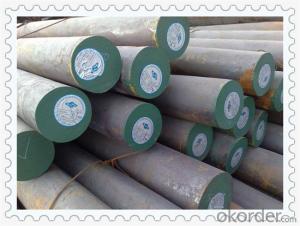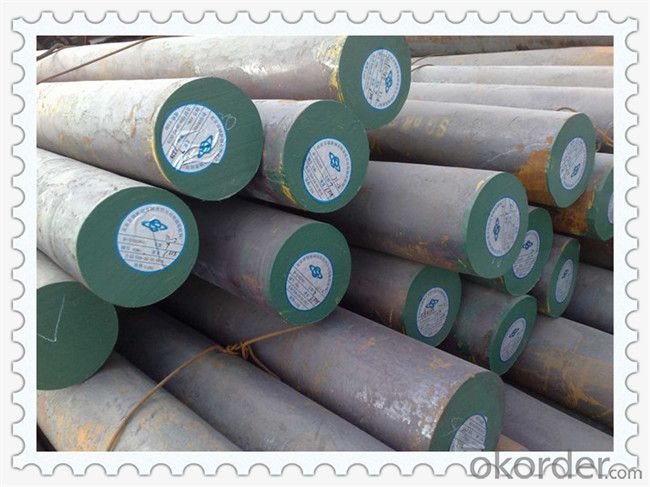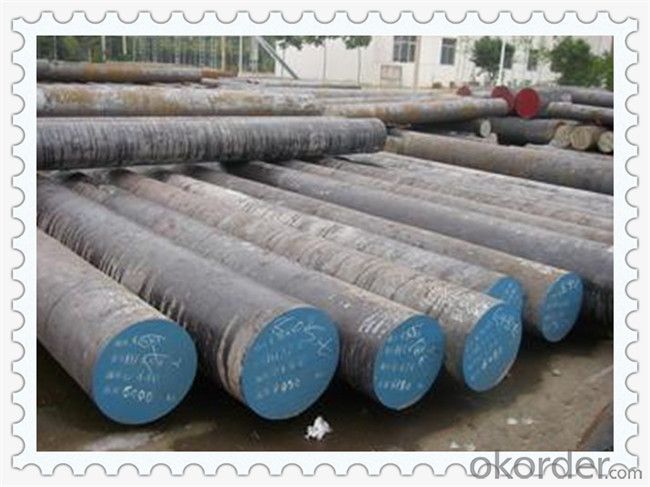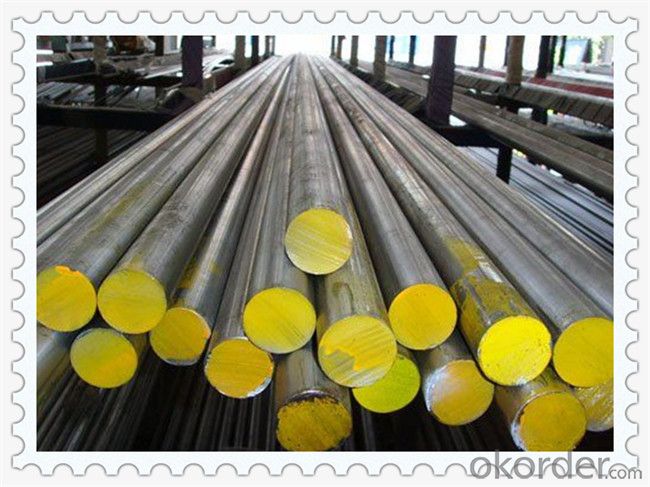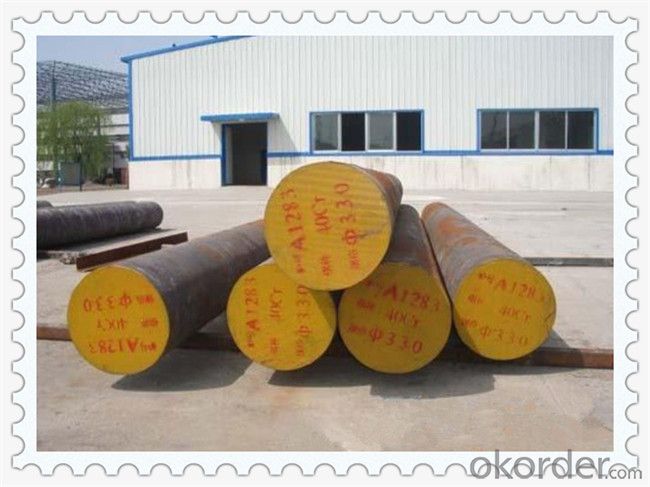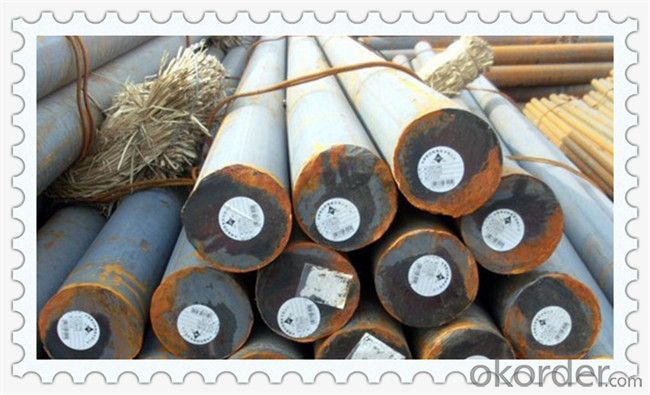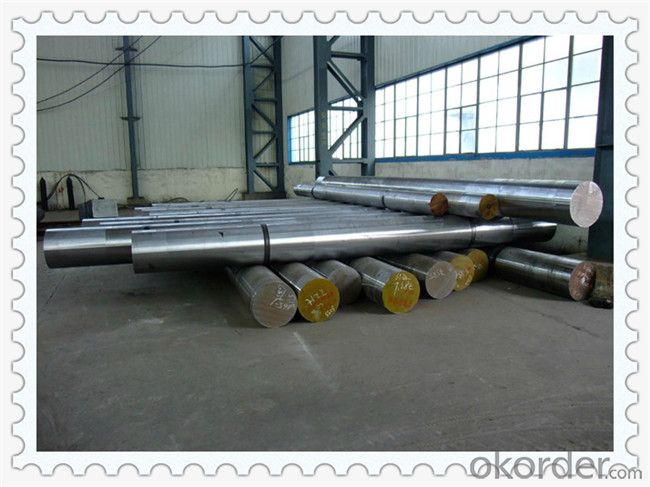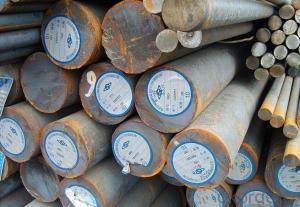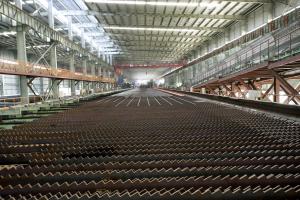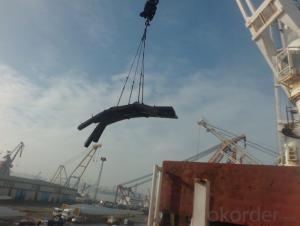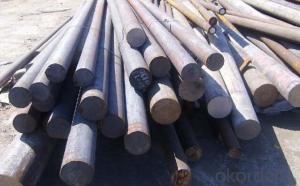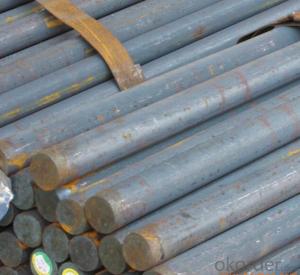Hot Rolled A36 Carbon Steel Round Bars
- Loading Port:
- China main port
- Payment Terms:
- TT OR LC
- Min Order Qty:
- 30 m.t.
- Supply Capability:
- 10000 m.t./month
OKorder Service Pledge
OKorder Financial Service
You Might Also Like
Hot Rolled A36 Carbon Steel Round Bars
Product Details
Material: Q195; Q235; A36; SS400; ST37; SAE1006/1008; S275JR; 20#; 45#;
Q345,S355JR; 16Mn; ST52;42CrMo; 40CrNiMo etc.
Dia.: 6mm--300mm(Hot rolled round bar)
6mm--110mm(Cold drawn round bar)
120mm--600mm(Forged round bar)
Length: fixed length, random length, (3m--12m)
Application of This Product:
Household Appliance | Refrigerator shutter &side panels, Rice Cooker, Washer, Microwave Ovens, Freezers, Air conditions, Water Heaters, Sterilization Cabinets, Range Hoods, Computer Panels , DVD/DVB panels, TV back panel etc. |
Construction Material | Fireproof Door &Kitchen Cabinet ,Ceiling, Sanitary Unit, Elevator etc. |
Transportation | Car, Ship, Trains, Aircraft Equipment. etc. |
Education and Health Field | Electronic Writing Boards, Projection Screens, Clean Operating Rooms, etc. |
Products Show
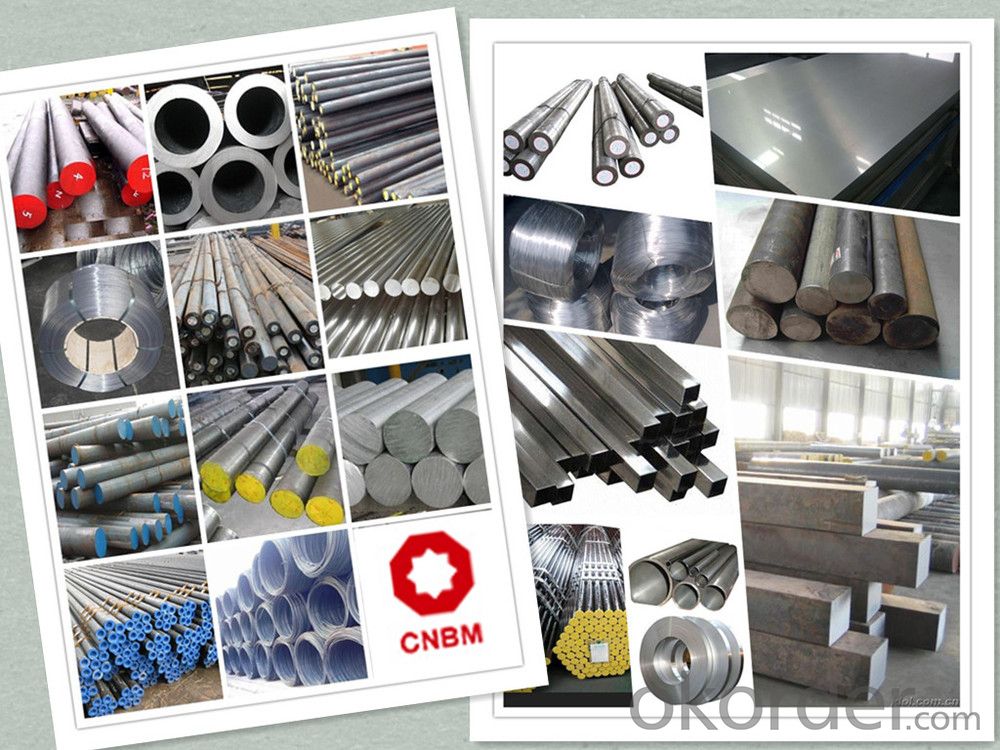
Product Overviews
| Product Name | Typical Grades | Diameter(mm) | Standard adopted |
| Carbon Steel | 20 (1020/S20C/C22) | Ø16-Ø300 |
GB/SAE/JIS/DIN
|
| 40 (1040/S40C/C40) | |||
| 45 (1045/S45C/C45) | |||
| Bearing Steel | GCr9 (51100/SUJ1) | Ø12-Ø250 | |
| GCr15 (52100/SUJ2/100Gr6) | |||
| GCr9SiMn (A485-Gr.1/SUJ3) | |||
Cr-Mo Steel | 20Cr (5120/SCr420H/20Cr4) | Ø12-Ø250 | |
| 40Cr (5140/SCr440/41Cr4) | |||
| 42CrMo(4140/SCM440/42CrMo4) | |||
| Gear Steel | 20CrNiMo | Ø16-Ø600 | |
| 20CrMn(5115/SMnC420/20MnCr5) | |||
| 20CrNiMo(8620/SNCM220/20CrMiMo2) |
Application
| Carbon Steel | Mold bottom, Plastic mold, Construction machinery parts Automobile parts, Security grills, Screens, Construction |
| Bearing Steel | Aerospace, Navigation, Nuclear energy, Chemical industry Electronic information, Petrochemical, Instrument and meter Transportation |
| Cr-Mo Steel | Mechanism & Fasteners gear, Stressed components for vehicles Engines and machines, Parts of larger cross-section |
| Gear Steel | All kinds of gears, Statically and dynamically stressed component for vehicles Engines and machine, Larger cross-section parts, Crankshafts |
Work Shop
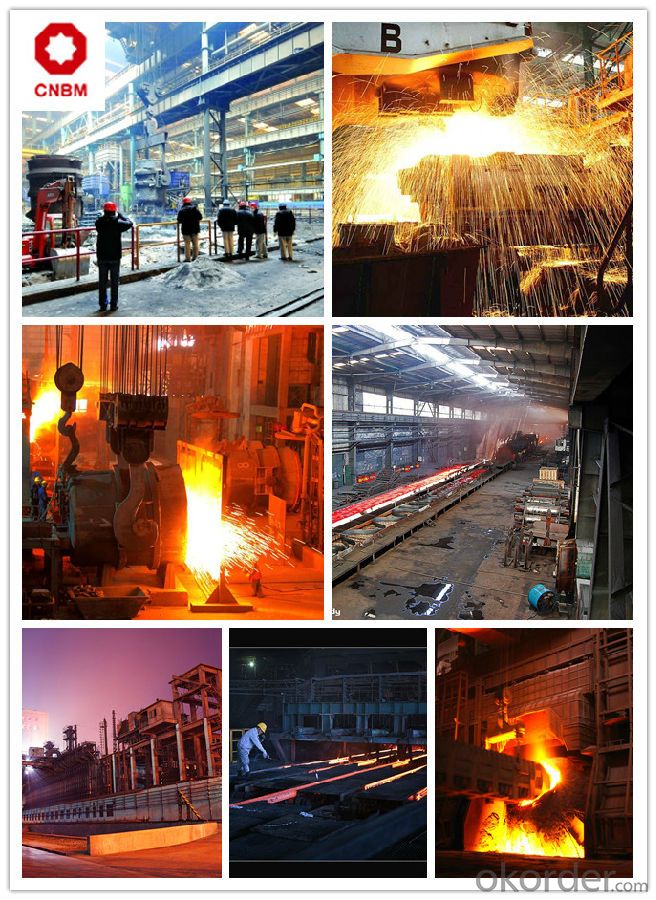
Company Information
CNBM International Corporation is the most important trading platform of CNBM group.
Whith its advantages, CNBM International are mainly concentrate on Cement, Glass, Iron and Steel, Ceramics industries and devotes herself for supplying high qulity series of refractories as well as technical consultancies and logistics solutions.

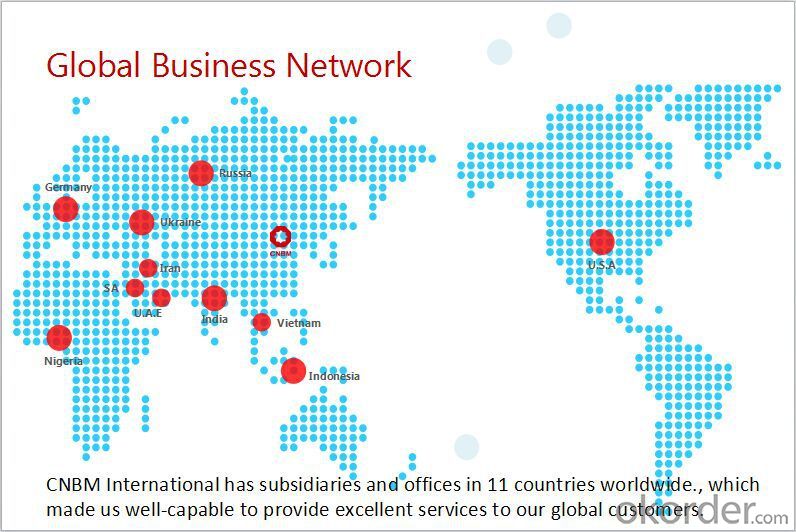
FAQ
1, Your advantages?
professional products inquiry, products knowledge train (for agents), smooth goods delivery, excellent customer solution proposale
2, Test & Certificate?
SGS test is available, customer inspection before shipping is welcome, third party inspection is no problem
3, Factory or Trading Company?
CNBM is a trading company but we have so many protocol factories and CNBM works as a trading department of these factories. Also CNBM is the holding company of many factories.
4, Payment Terms?
30% TT as deposit and 70% before delivery.
Irrevocable L/C at sight.
5, Trading Terms?
EXW, FOB, CIF, FFR, CNF
6, After-sale Service?
CNBM provides the services and support you need for every step of our cooperation. We're the business partner you can trust.
For any problem, please kindly contact us at any your convenient time.
We'll reply you in our first priority within 24 hours.
Packaging & Delivery
1, Packaging: seaworthy package or as required
2, Delivery: 35-45 days or based on quantity
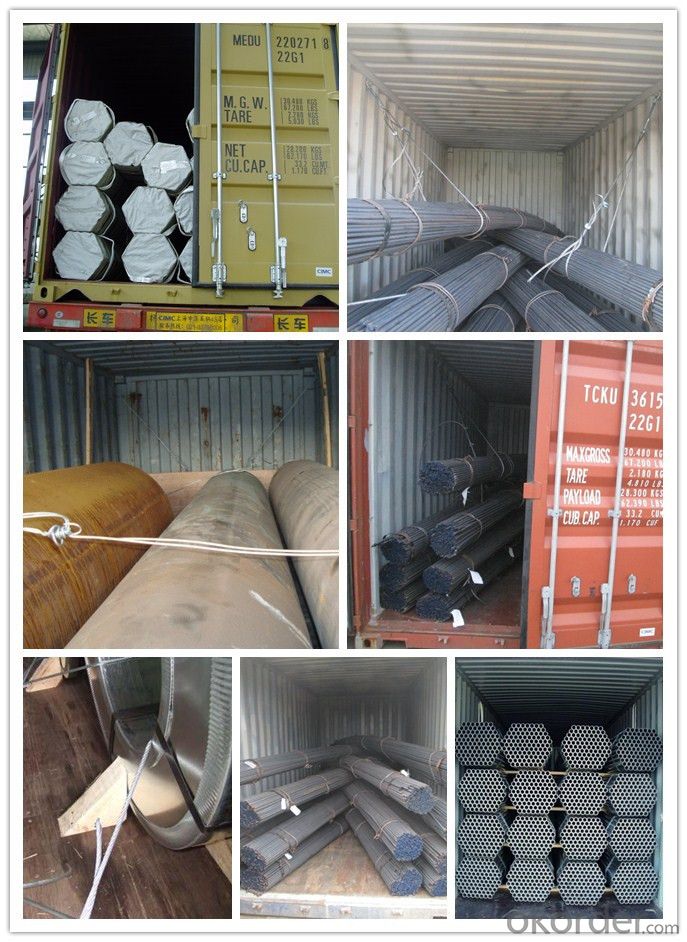
- Q: What are the different types of steel round bar alloys for improved machinability and strength?
- Improved machinability and strength can be achieved with several variations of steel round bar alloys. These alloys are designed specifically for industries where efficient machining and high tensile strength are essential. Here are some of the popular alloys used: 1. 12L14: This alloy incorporates lead, functioning as a lubricant during machining. This results in improved chip formation and reduced tool wear. Its exceptional machinability and good strength make it ideal for applications involving intricate machining processes. 2. 4140: Known as "chromoly" steel, this alloy contains chromium and molybdenum, which enhance its strength and hardenability. It is extensively used in applications that demand high tensile strength, such as automotive parts, shafts, and gears. 3. 8620: This low-alloy nickel-chromium-molybdenum steel offers a combination of high strength and good toughness. It can be easily machined and is commonly employed in case-hardening applications like gears, shafts, and fasteners. 4. 1018: Referred to as "cold-rolled" or "cold-finished" steel, 1018 is a low-carbon alloy with good machinability and weldability. It finds common usage in applications requiring precise and smooth finishes, such as bolts, screws, and hydraulic fittings. 5. 52100: This high carbon, chromium-bearing steel is primarily used for manufacturing bearings and other high-wear applications. It offers excellent hardness, wear resistance, and machinability, making it suitable for components necessitating strength and durability. These examples illustrate the range of steel round bar alloys available to enhance machinability and strength. The choice of alloy depends on specific application requirements, including desired strength, machinability, and durability. Consulting with a materials engineer or supplier can assist in identifying the most suitable alloy for a particular use case.
- Q: Are steel round bars prone to deformation?
- Yes, steel round bars can be prone to deformation under certain conditions. Factors such as excessive heat, extreme pressure, or improper handling can cause steel round bars to bend, warp, or twist. However, when manufactured and used properly, steel round bars are highly durable and resistant to deformation.
- Q: How do you calculate the torsional strength of a steel round bar?
- To determine the torsional strength of a steel round bar, it is necessary to take into account its material properties and dimensions. The torsional strength, also referred to as torsional yield strength or shear strength, denotes the maximum torque or twisting force that a round bar can endure without experiencing permanent deformation or failure. The torsional strength can be calculated using the following formula: Torsional Strength = (Torsional Constant * Yield Strength) / (Polar Moment of Inertia * Length) 1. Torsional Constant: This constant relies on the shape of the round bar's cross-section. In the case of a solid round bar, the torsional constant is given by (π * D^4) / 32, where D represents the bar's diameter. 2. Yield Strength: This is the stress at which the steel material starts to plastically deform. It is typically provided by the manufacturer or can be determined through material testing. 3. Polar Moment of Inertia: This property signifies the round bar's resistance to torsional deformation. For a solid round bar, the polar moment of inertia equals (π * D^4) / 32. 4. Length: This denotes the extent of the round bar where the torsional force is applied. By substituting these values into the formula, the torsional strength of the steel round bar can be calculated. It is important to note that this computation assumes the round bar is completely homogeneous, devoid of any defects, and subjected solely to pure torsion. It is crucial to bear in mind that torsional strength is just one factor to consider when assessing the suitability of a steel round bar for a specific application. Other considerations, such as fatigue strength, corrosion resistance, and load-bearing capacity, should also be taken into account. For accurate calculations and appropriate material selection, it is advisable to consult a professional engineer or refer to pertinent industry standards.
- Q: What are the cost considerations for steel round bars?
- Cost considerations for steel round bars can vary depending on several factors. Firstly, the type and grade of steel used in the production of the round bars can greatly impact the cost. Different types of steel, such as carbon steel, alloy steel, or stainless steel, have varying costs due to differences in their composition and properties. Higher grade steel with superior strength and durability will generally be more expensive than lower grade options. Secondly, the size and dimensions of the round bars will also affect the cost. Larger diameter and length of the bars will require more raw material and additional processing, resulting in higher costs. Additionally, specialized shapes or custom sizes may require extra manufacturing steps or tooling, which can increase the overall price. The quantity or volume of round bars ordered can also influence the cost. Bulk orders typically benefit from economies of scale, allowing for reduced unit costs. Furthermore, longer-term contracts or partnerships with suppliers can result in better pricing agreements. Transportation and logistics expenses should also be taken into account. The cost of shipping steel round bars can vary depending on the distance, mode of transportation, and handling requirements. International shipping, for instance, may involve additional customs duties and taxes. Lastly, market conditions and fluctuations in the steel industry can impact the cost of round bars. Factors such as supply and demand, raw material costs, and currency exchange rates can all influence the final price. It is important to stay updated with market trends and work closely with suppliers to negotiate favorable pricing. Considering these various factors, it is crucial to conduct thorough research, compare quotes from multiple suppliers, and evaluate the quality-to-price ratio before making a decision. This will help ensure that the cost of steel round bars aligns with your budget and meets your specific requirements.
- Q: How are steel round bars inspected for quality?
- Steel round bars are inspected for quality through various methods such as visual inspection, dimensional measurements, and non-destructive testing techniques. These inspections involve checking for surface defects, ensuring accurate dimensions, and detecting any internal flaws or inconsistencies. Additionally, quality control measures may include hardness testing, chemical analysis, and mechanical property evaluations to ensure the steel bars meet the required standards and specifications.
- Q: What is the difference between a solid round bar and a hollow round bar?
- A cylindrical shape, known as a solid round bar, consists of a single material, typically metal or plastic. It maintains a consistent diameter throughout its length, without any empty space inside. In contrast, a hollow round bar also has a cylindrical shape but contains a hollow space within its center. This hollow space creates a tube-like structure within the bar. The outer diameter remains constant, but the inner diameter varies depending on the design and purpose of the hollow round bar. The primary distinction between a solid round bar and a hollow round bar lies in their structural characteristics and potential uses. The solid round bar offers strength and rigidity due to its solid core, making it suitable for applications requiring robust support or load-bearing capabilities. It finds common usage in construction, manufacturing, and engineering projects where strength and durability are vital. Conversely, the hollow round bar combines strength with a lightweight design. The presence of the hollow space reduces the overall weight while maintaining structural integrity. This makes hollow round bars ideal for applications prioritizing weight reduction, such as in the aerospace, automotive, and marine industries. Furthermore, the hollow space can serve various purposes, such as facilitating the passage of fluids, wires, or other components through the bar. In conclusion, while both solid and hollow round bars possess a cylindrical shape, the presence or absence of a hollow space distinguishes them. Solid round bars offer strength and rigidity, while hollow round bars strike a balance between strength and reduced weight, with the potential for additional functionality. The choice between the two depends on the specific requirements and intended application of the bar.
- Q: What are the advantages of using nickel-tin alloy steel round bars?
- There are several advantages of using nickel-tin alloy steel round bars. Firstly, nickel-tin alloy steel has excellent corrosion resistance properties. This makes it ideal for applications where the round bars will be exposed to harsh environments or corrosive substances. The addition of nickel and tin enhances the overall durability and longevity of the round bars, ensuring they can withstand prolonged exposure to moisture, chemicals, and other corrosive elements. Secondly, nickel-tin alloy steel round bars offer superior strength and toughness. The combination of nickel and tin in the alloy composition enhances the overall mechanical properties of the bars, making them highly resistant to deformation, bending, and breaking. This makes them suitable for demanding applications that require high strength and durability, such as in construction, aerospace, and automotive industries. Additionally, nickel-tin alloy steel round bars exhibit excellent heat resistance. They can withstand high temperatures without significant loss of strength or deformation. This makes them ideal for applications that involve exposure to elevated temperatures, such as in furnaces, boilers, and heat exchangers. Furthermore, nickel-tin alloy steel is known for its excellent electrical conductivity. This property makes the round bars suitable for applications that require efficient electrical transmission, such as in electrical wiring, power generation, and electrical equipment manufacturing. Lastly, nickel-tin alloy steel round bars are relatively easy to machine and fabricate. They can be readily shaped, cut, and welded, allowing for versatility in various manufacturing processes. This ease of machining and fabrication ensures efficient production and reduces overall manufacturing costs. In conclusion, the advantages of using nickel-tin alloy steel round bars include excellent corrosion resistance, superior strength and toughness, high heat resistance, good electrical conductivity, and ease of machining and fabrication. These properties make nickel-tin alloy steel round bars a preferred choice for a wide range of applications in various industries.
- Q: How do you check the quality of a steel round bar?
- To check the quality of a steel round bar, several factors need to be considered. Firstly, it is important to assess the bar's dimensions. This involves measuring its diameter, length, and straightness. Any deviation from the specified dimensions could indicate a lower quality bar. Next, the surface condition of the steel round bar should be inspected. It should be free from any visible defects, such as cracks, pits, or surface irregularities. Additionally, the bar's surface should be smooth and devoid of any significant roughness or burrs. Furthermore, the chemical composition of the steel round bar must be examined. This can be determined through spectroscopic analysis or other testing methods. The composition should meet the required standards and specifications, as any deviations can affect the bar's strength and durability. Another crucial aspect to consider is the mechanical properties of the steel round bar. This involves testing its tensile strength, yield strength, and elongation. These tests can be conducted using specialized machines to ensure that the bar meets the necessary strength requirements. Additionally, the steel round bar can be subjected to non-destructive testing methods, such as ultrasonic testing or magnetic particle inspection. These techniques help identify any internal or surface defects that may impact the bar's quality. Furthermore, it is essential to verify the bar's compliance with industry standards and certifications. This includes checking if the steel round bar meets the specifications set by organizations such as ASTM International or ISO. Lastly, it is advisable to consult with reputable suppliers or manufacturers who have a proven track record in producing high-quality steel round bars. They can provide documentation, certifications, and test reports to validate the quality of their products. In summary, evaluating the dimensions, surface condition, chemical composition, mechanical properties, compliance with standards, and supplier's reputation are key steps to check the quality of a steel round bar. By thoroughly examining these factors, one can ensure the reliability and performance of the steel round bar for their intended applications.
- Q: How do you calculate the cross-sectional area of a steel round bar?
- In order to determine the cross-sectional area of a steel round bar, it is necessary to possess knowledge of either its diameter or radius. The formula for calculating the cross-sectional area of a circle is A = πr^2, wherein A represents the area and r denotes the radius of the circle. When provided with the diameter of the round bar, one can simply divide it by 2 to obtain the radius. Once the radius is ascertained, it can be substituted into the formula to compute the cross-sectional area. It is important to bear in mind that the value of π is approximately 3.14159.
- Q: Are steel round bars suitable for conveyor belt applications?
- Depending on various factors, conveyor belt applications can benefit from the use of steel round bars. These bars are renowned for their strength, durability, and resistance to wear and tear, making them a viable choice for applications involving heavy loads, high speeds, or abrasive materials. One of the main advantages of utilizing steel round bars in conveyor belt applications lies in their ability to withstand heavy loads. Their strength ensures that the bars can support the weight of conveyed materials without bending or breaking. This is particularly crucial in industries where continuous transportation of large quantities of bulky or heavy materials is required. Moreover, steel round bars exhibit high resistance to wear and tear. The smooth surface of the bars reduces friction, resulting in minimal wear on the conveyor belt and prolonging its lifespan. This is especially important in applications where the conveyor belt constantly moves and comes into contact with abrasive materials, such as in the mining or construction industries. Additionally, steel round bars are capable of withstanding high speeds without compromising their structural integrity. Their high tensile strength enables them to handle the forces exerted on the conveyor belt during acceleration or deceleration. As a result, the conveyor system operates smoothly and efficiently, reducing downtime and enhancing productivity. However, it is crucial to consider the specific requirements of the conveyor belt application when selecting steel round bars. Factors such as the type of conveyed materials, the operating environment, and the specific load and speed requirements should be carefully evaluated. In certain cases, alternative materials or coatings may be necessary to enhance the performance and longevity of the conveyor system. In conclusion, steel round bars can be a suitable choice for conveyor belt applications due to their strength, durability, and resistance to wear and tear. Nonetheless, careful consideration of the specific application requirements is essential to ensure optimal performance and longevity of the conveyor system.
Send your message to us
Hot Rolled A36 Carbon Steel Round Bars
- Loading Port:
- China main port
- Payment Terms:
- TT OR LC
- Min Order Qty:
- 30 m.t.
- Supply Capability:
- 10000 m.t./month
OKorder Service Pledge
OKorder Financial Service
Similar products
Hot products
Hot Searches
Related keywords
